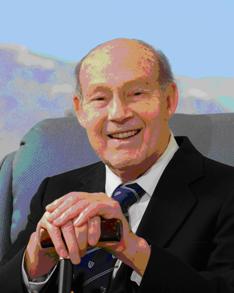
Geoffrey W. Bromiley, renowned church historian and historical theologian, and professor emeritus at Fuller Seminary in Pasadena , passed away this last Friday, August 7. One could well argue that he was one of the most significant background figures in 20th century theology. He helped shape English-language Christianity over the past six decades, translating and editing—from several original languages—thousands upon thousands of pages of theological works from such notables as Karl Barth, Jacques Ellul, Helmut Thielicke, Wolfhart Pannenberg, and Ernst Kaseman, among others.
First a personal word before I note the official notice from Fuller Theological seminary. I was a student of Bromiley’s in the 1970s, and have said repeatedly over the years that he was my favorite professor. Not because he was a dynamic lecturer or the type of professor whose popularity is able to attract a fan base of devoted students. His lectures were succinct, clear, organized, and ended on time, with room for questions afterwards—a decidedly unusual practice (most professors were not so disciplined, and we were always making up for lost time in their classes).
Bromiley’s knowledge of church history and theology was proverbially encyclopedic: many times I stood in line after class as one student after another asked him questions regarding their term paper, and no matter the topic—and they were diverse as you might expect in a church history overview class covering 1,500 years at a stretch!—he could recommend without a pause a number of books that needed to be consulted.
Probably the most impressive thing about him was his willingness to serve the church by giving voice to others. While Bromiley had his own decided theological views, he gave his life that others might be known in the English-speaking world through his translations. In this regard he was an icon of humble scholarship.
The last article he wrote for CT was on the openness theology debate, “Only God Is Free.”
From the Fuller announcement:
Among his many translations widely used by English-language readers are the 10-volume Theological Dictionary of the New Testament, edited by Gerhard Kittel; extensive portions of Karl Barth’s Church Dogmatics; Wolfhart Pannenberg’s three-volume Systematic Theology; and Commentary on Romans by Ernst Kasemann.
Bromiley was also the English-language editor of the monumental Encyclopedia of Christianity (translated from a German language resource), the fifth volume of which he completed in 2007—past his 90th year. “His work as the English-language editor of these five volumes is without question among the most painstaking work a scholar can be called upon to do. Few there are who are equal to the challenge,” said Robert P. Meye, the former dean of Fuller’s School of Theology, who served during many of the years while Bromiley was Professor of Church History and Historical Theology at Fuller.
“Geoffrey Bromiley was one of Fuller’s most accomplished faculty members, distinguishing himself as a professor, scholar, author, translator, and mentor,” said Howard Loewen, dean of the School of Theology and professor of theology and ethics at Fuller. Loewen, who was a PhD student under Bromiley, remembers Bromiley’s vocational life and theological work as “characterized by a passion for the church and its ministry in the world. He embodied and advanced in a remarkable way the evangelical identity and ecumenical mission of Fuller Seminary, and contributed to the theological formation of a generation of seminary students and church leaders.”
Professor James E. Bradley was also Bromiley’s student, later his colleague, and currently is the Geoffrey W. Bromiley Professor of Church History. “The strength of his character exercised an enormous influence on those of us who were his students and colleagues,” said Bradley. “His singular dedication to Jesus Christ and his love for the church shaped us both spiritually and intellectually. His understanding of the discipline of scholarship as part of the ministry of the Word of God will continue to influence Fuller’s future.”
Bromiley, born in Bromley Cross, Lancashire, England, in 1915, earned his MA at Cambridge and his PhD, DLitt, and DD at Edinburgh University. Ordained in the Church of England, he served from 1951 to 1958 as Rector of St. Thomas’s Church, Edinburgh. In 1958, he accepted the appointment as Professor of Church History and Historical Theology at Fuller, where he served until his retirement in 1987.
In addition to his translating and editing, Bromiley was also the author of 14 books, including Baptism and the Anglican Reformers; The Unity and Disunity of the Church; Historical Theology: An Introduction; God and Marriage; and An Introduction to the Theology of Karl Barth.
Bromiley is survived by his wife, Isobel, and their two daughters, Katherine and Ruth.
Image of Geoffrey Bromily by Don Milici.









